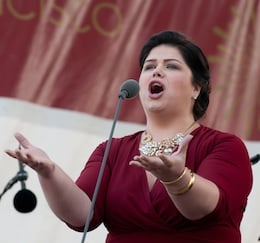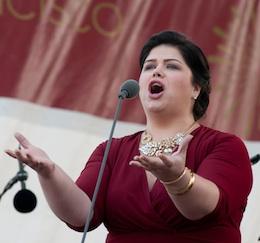
Photo by Scott Wall
As I entered the long, low-ceilinged salon of the Hotel Rex for Leah Crocetto's recital there, I was worrying that her voice would be too big for the place. I would soon find out: I was seated up close to the soprano and the piano of her superb accompanist (and head of music at San Francisco Opera), John Churchwell.
But there was no cause for concern. Not only is Crocetto the mistress of grand romantic sweep, she is equally adept at scaling down her instrument to semi-hushed, floating sweetness. When she did open her voice full throttle, as she did in Liszt’s operatic “Pace non trovo” (I find no peace) from Tre Sonetti del Patrarca, her flawless high C did not so much boom out piercingly as open to ultimate emotional expression. With Churchwell playing with the intensity of a Liszt recitalist, the experience was so all-encompassing and beautiful that I closed my eyes to absorb it without visual distraction.
Time and again I found myself with eyes closed. At such “pinch me” moments, my only desire was to sink in the sheer luxury of sound and focus that Crocetto brought to her repertoire.
Crocetto began with Mozart’s “Non mi dir” from Don Giovanni. In technical security, intonation, and total ease on top, she scored top honors. It was a performance that longed for the big stage.
As beautiful as Crocetto’s poised, classical singing can be, her being yearns for the emotional expanse of romantic repertoire. In three gorgeous songs by Rachmaninoff, Richard Strauss’ “Die Nacht” and “Cäcilie,” and a Liszt set that also included “O Quand Je Dors,” she shone.
In singing that freely encompassed soaring fulness and softly floated highs, she revealed the heart that lies at the core of her sound. If the voice is truly a mirror of the soul, Crocetto’s unforced, timbre in her lower midrange gives evidence of the sweet soul that speaks through her most intense romantic outpourings. It is her uncommon facility to move between the intimate and the grand, all in a voice that speaks of truth rather than capricious artifice, that elevates her beautiful sound to the level of high art.
Crocetto explained that this was her first public performance of “O Quand Je Dors.” As such, it was remarkable. While her slow tempo and vulnerability came closer to conveying the beauty of Frederica von Stade’s incomparable early recording with Martin Katz than I ever thought possible, it sounded as though she is still deciding how to manage her slow downward descent following her great “Ah!”
Cabaret a la Carte
Before Crocetto embarked on her operatic career, she spent a while singing jazz on restaurant row in New York City and waiting tables to supplement her income. If, as she says, it was not the life for her, she certainly learned how to convey the heartache of “I’ll Be Seeing You,” “With Every Breath I Take,” and “Cry Me a River.” With operatic radiance replaced by borscht belt gusto, Crocetto supplied all the nuance and changes of tone this music calls for. It was, in a word, fabulous.
The icing on the cake was Jeanine Tesori’s “The Girl in 14G.” Written for Kristin Chenoweth, this hilarious number included a perfect imitation of an opera wannabee singing the Queen of the Night, with every bright staccato polished like a flawless jewel.
Crocetto has already announced upcoming concerts with the Berlin Philharmonic, and appearances at Houston Grand Opera (Female Chorus in The Rape of Lucretia) and Santa Fe Opera (Anna in Maometto II). There will be far more. To borrow her own phrase, her “legion of repeat offenders” is growing exponentially.

